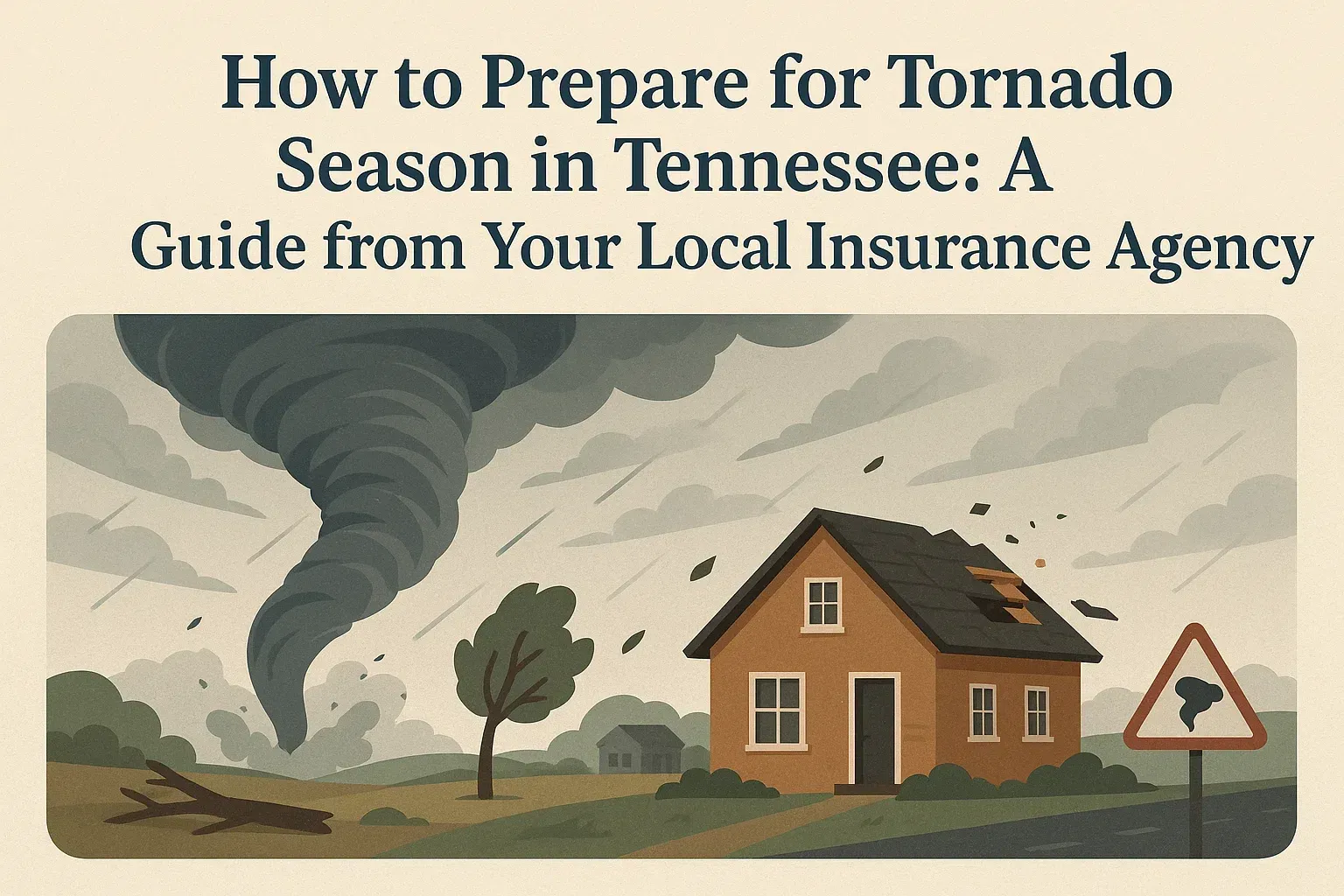lance • August 27, 2025
How to Prepare for Tornado Season in Tennessee: A Guide from Your Local Insurance Agency
Are You At Risk?

Tennessee is known for its rich musical heritage, scenic beauty, and southern hospitality—but it’s also known for its unpredictable weather. Spring and early summer often bring severe thunderstorms that can quickly evolve into dangerous tornadoes. In fact, the state averages about 30 tornadoes a year, with Middle and West Tennessee
being particularly vulnerable.
For residents and property owners, preparation isn’t just about boarding up windows—it’s also about making sure you’re protected financially and legally through proper insurance coverage. At 615 Insurance, we believe being proactive
can make all the difference when tornado season arrives.
Here’s your comprehensive guide to preparing for tornado season in Tennessee—from an insurance perspective.
1. Understand the Tornado Risks in Tennessee
Tennessee is in a region often referred to as “Dixie Alley,” an area in the southeastern U.S. that experiences frequent and sometimes deadly tornadoes.
Unlike “Tornado Alley” in the Midwest, Dixie Alley storms often occur at night and outside the traditional spring tornado season, which makes them especially dangerous.
Some counties in Tennessee, including Davidson, Shelby, and Rutherford, have been struck multiple times in recent years. As your local insurance provider, we stay up to date with weather trends and FEMA data to help you stay protected year-round—not just during peak months.
2. Review Your Homeowners Insurance Coverage
Many homeowners believe that tornado damage is automatically covered by their insurance, but that’s not always the case—especially when it comes to specific exclusions, deductibles, or policy limits.
Here’s what to check:
✅ Dwelling Coverage Limits
Make sure your policy covers the full cost to rebuild your home—not just the market value. In tornado-prone areas, replacement cost coverage is essential.
✅ Wind and Hail Deductibles
Some policies have a separate deductible specifically for wind or hail damage, which can be higher than your standard deductible. Know what yours is and whether it’s a flat amount or a percentage of your home's value.
✅ Detached Structures
Garages, sheds, fences, and other structures may not be fully covered under your standard dwelling coverage. Check the limits on “Other Structures” in your policy.
✅ Loss of Use / Additional Living Expenses (ALE)
If your home becomes uninhabitable due to tornado damage, will your policy help cover hotel stays, meals, or temporary housing? This is one of the most overlooked yet critical coverages to have.
3. Inventory Your Possessions Now—Before the Storm
Documenting what you own can significantly speed up your claims process. Tornadoes can destroy everything in their path, leaving little to nothing behind. Creating a digital home inventory gives you peace of mind and proof
of what was lost.
We recommend:
• Taking photos or videos of each room
• Saving purchase receipts and serial numbers
• Using a digital app or spreadsheet that can be backed up to the cloud
• Reviewing this inventory at least once a year
If you’d like a free printable or digital inventory template, reach out to us—we’re happy to help.
4. Understand What’s NOT Covered
Standard homeowners insurance does not cover flood damage. Tornadoes often come with torrential rain and storms that can cause flash flooding. If you live in a low-lying or high-risk flood area, consider purchasing a separate flood insurance
policy through the National Flood Insurance Program (NFIP) or a private carrier.
Additionally, check for these common exclusions:
• Earth movement (sinkholes, landslides)
• Mold or water damage from poor drainage
• Pre-existing roof or structural issues
If you're unsure what your policy excludes, bring it by our office or send it in for a free coverage review.
5. Prepare Your Property Physically
Insurance is essential, but physical preparation
can help reduce the risk of damage in the first place.
Here are steps to take before a storm:
• Trim dead tree limbs that could fall on your home
• Secure loose items like patio furniture, grills, and garbage cans
• Reinforce garage doors, which are vulnerable to wind damage
• Clear gutters and downspouts to prevent water buildup
• Anchor mobile homes or small structures to the ground
Home improvements like storm shutters or reinforced roofing can also qualify you for premium discounts. Ask us if your upgrades might help you save.
6. Build a Tornado Emergency Kit
Every family in Tennessee should have a tornado emergency kit ready to go.
Your kit should include:
• First-aid supplies
• Flashlights with extra batteries
• Battery-powered weather radio• Bottled water and non-perishable food
• Phone chargers and backup batteries
• Important documents (including a copy of your insurance policy)
• Pet supplies if you have animals
Store your kit in your designated storm shelter or interior room without windows—like a closet or bathroom.
7. Know the Claims Process Before You Need It
When a tornado hits, emotions run high. Understanding how the insurance claims process works can save you frustration later.
Here’s what to do:
1. Contact your agent ASAP – The sooner you report the claim, the sooner the process starts.
2. Document everything – Take photos and videos of the damage before cleaning up.
3. Prevent further damage – Cover exposed areas with tarps or plywood to avoid additional losses.
4. Keep receipts – For repairs, temporary lodging, or other out-of-pocket expenses.
We recommend keeping your insurance agent’s contact info saved in your phone and written in your emergency kit.
8. Consider Additional Coverage Options
If your home is in a high-risk area, or you simply want extra peace of mind, consider these supplemental coverages:
• Extended Replacement Cost Coverage – Helps if rebuilding costs exceed your policy limits.
• Debris Removal Coverage – Covers the cost of cleaning up storm wreckage.
• Equipment Breakdown – Covers damaged appliances or HVAC units from power surges.
• Business Interruption (for home-based businesses) – Replaces lost income if your operations are paused due to storm damage.
A personalized policy review is the best way to see if any of these make sense for your home, budget, and risk level.
9. Stay Weather-Aware During Tornado Season
The best defense is awareness.
Sign up for local weather alerts from the National Weather Service and download a trusted weather app. If a tornado warning is issued, take it seriously and head to your designated shelter area immediately.
Being prepared doesn’t mean being scared—it means being ready. And your insurance coverage should be just as ready as your emergency kit.
Final Thoughts: Let Us Help You Weather the Storm
Tornadoes may be part of life in Tennessee, but dealing with the aftermath doesn’t have to be overwhelming. At 615 Insurance, we’re not just here to sell policies—we’re here to be your trusted partner when it matters most.
Let’s make sure your coverage is built for Tennessee’s unique risks. Call us today or schedule a free policy review. We’re happy to help you prepare, protect, and recover—no matter what the skies may bring.
Need help reviewing your policy or updating your coverage before tornado season?
Contact us at (615)809-1225 or email Lance@615insured.com—we’re local, we’re ready, and we care.

